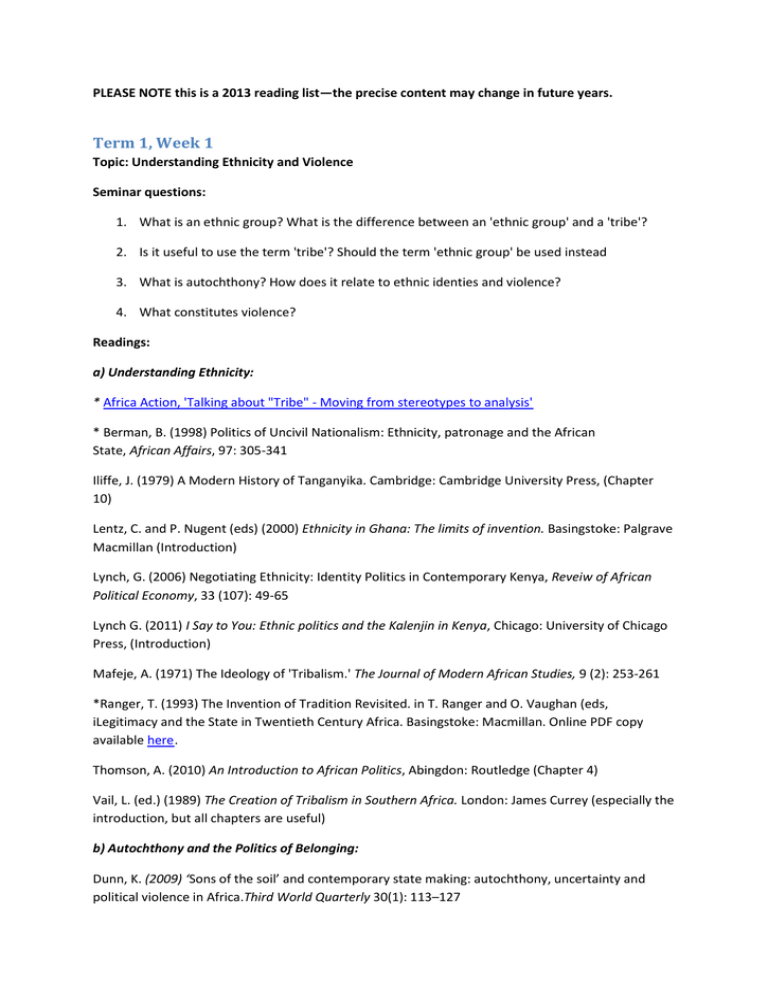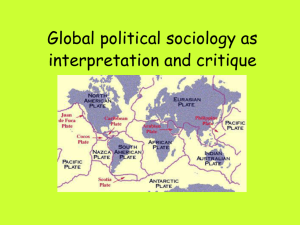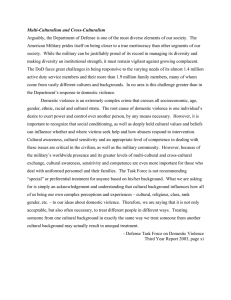Term 1, Week 1
advertisement

PLEASE NOTE this is a 2013 reading list—the precise content may change in future years. Term 1, Week 1 Topic: Understanding Ethnicity and Violence Seminar questions: 1. What is an ethnic group? What is the difference between an 'ethnic group' and a 'tribe'? 2. Is it useful to use the term 'tribe'? Should the term 'ethnic group' be used instead 3. What is autochthony? How does it relate to ethnic identies and violence? 4. What constitutes violence? Readings: a) Understanding Ethnicity: * Africa Action, 'Talking about "Tribe" - Moving from stereotypes to analysis' * Berman, B. (1998) Politics of Uncivil Nationalism: Ethnicity, patronage and the African State, African Affairs, 97: 305-341 Iliffe, J. (1979) A Modern History of Tanganyika. Cambridge: Cambridge University Press, (Chapter 10) Lentz, C. and P. Nugent (eds) (2000) Ethnicity in Ghana: The limits of invention. Basingstoke: Palgrave Macmillan (Introduction) Lynch, G. (2006) Negotiating Ethnicity: Identity Politics in Contemporary Kenya, Reveiw of African Political Economy, 33 (107): 49-65 Lynch G. (2011) I Say to You: Ethnic politics and the Kalenjin in Kenya, Chicago: University of Chicago Press, (Introduction) Mafeje, A. (1971) The Ideology of 'Tribalism.' The Journal of Modern African Studies, 9 (2): 253-261 *Ranger, T. (1993) The Invention of Tradition Revisited. in T. Ranger and O. Vaughan (eds, iLegitimacy and the State in Twentieth Century Africa. Basingstoke: Macmillan. Online PDF copy available here. Thomson, A. (2010) An Introduction to African Politics, Abingdon: Routledge (Chapter 4) Vail, L. (ed.) (1989) The Creation of Tribalism in Southern Africa. London: James Currey (especially the introduction, but all chapters are useful) b) Autochthony and the Politics of Belonging: Dunn, K. (2009) ‘Sons of the soil’ and contemporary state making: autochthony, uncertainty and political violence in Africa.Third World Quarterly 30(1): 113–127 Geschiere, P. (2009) The Perils of Belonging: Autochthony, Citizenship and Exclusion in Africa and Europe (Chicago: University of Chicago Press) Geschiere, P. & Jackson, S. (2006) Autochthony and the crisis of citizenship: democratization, decentralization, and the politics of belonging. African Studies Review 49(2): 1–14 * Jackson, S. (2006) Sons of which soil? The language and politics of autochthony in Eastern D. R. Congo. African Studies Review 49(2): 95–123 Lynch, G. (2011) The Wars of Who Belongs Where: The Unstable Politics of Autochthony on Kenya’s Mt Elgon. Ethnopolitics10 (3-4): 391-410 Mamdani, M. (1996) Citizen and Subject: Contemporary Africa and the Legacy of late Colonialism. Princeton: Princeton University Press (Chapters 2 & 3) Marshall-Fratani, R. (2006) The war of ‘who is who’: autochthony, nationalism and citizenship in the Ivorian crisis. African Studies Review 49(2): 9–43 c) Understanding Violence: Farmer P. (1996) On suffering and structural violence: A view from below, Daedalus 125 (1): 261-283 Farmer, P. (2004) An Anthropology of Structural Violence. Current Anthropology 45 (3) * Galtung, J. (1969) Peace, and Peace Research. Journal of Peace Research 6 (3): 167-191 Galtung, J. & T. Hoivik (1971) Structural and direct violence. Journal of Peace Research 18 (1): 73-76 Galtung, J. (1985) Twenty-five years of peace research: Ten challenges and some responses. Journal of Peace Research 22 (2): 141-158 Galtung, J. (1990) Cultural Violence. Journal of Peace Research 27 (3): 291-305 Pearce, J. (2009) Introduction: Researching democracy and social change with violence in the foreground. IDS Bulletin 40 (3): 1-9 Petersen, R. D. (2002) Understanding ethnic violence. Cambridge: Cambridge University Press (Introduction)






